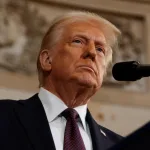CEO of the Centre for the Promotion of Private Enterprise (CPPE), Dr Muda Yusuf, has advised the Nigerian government to make policies that reduce import dependence, warning that it poses a major risk to the economic and social security of a country.
Dr Yusuf gave the advice while highlighting the implications of the policies adopted by the President of the United States, Donal Trump, on global economy and Nigeria in particular.
Join our WhatsApp ChannelSince he assumed office on 20 January 2025, Trump has signed a series of Executive Orders, indicating US policy direction in the areas of trade, immigration and energy among others.
For instance, Trump had during his inaugural address, pledged commitment to increasing oil output to reduce energy prices in the USA and globally. There have also been a couple of trade tariffs imposed on major US trading partners with their implications on supply chain disruption and prices.
These developments according to analysts, have remarkable implications on the global economy.
Yusuf observed that “these developments have multi-dimensional implications for the Nigerian economy.”
“There are immediate and remote consequences for energy prices, trade relations, economic diplomacy, macroeconomic stability, donor funding and capital flows. These are evolving outcomes of the Trump presidency which would impact the outlook for the Nigerian economy in the near term,” he added.
READ ALSO: Trump’s Tariff Threats Shake Global Stock Markets
Highlighting the implications of Trump’s policies on energy prices, Yusuf said that the USA being the largest oil producer globally for the past six years, is in a good position to influence global oil output and prices.
The economic expert asserted that if the US president succeeds in his current efforts to quell global geopolitical tensions such as Russia-Ukraine war and Israel-Hamas war, there are chances that global oil output would rise significantly as Russia supplies about 10 mbd of crude oil to the global oil market, leading to drop in oil prices.
The scenario, according to him, might affect Nigeria’s oil revenue and the realisation of the crude oil price benchmark of $75 per barrel in the 2025 budget.
“This would impact the outlook for government revenue and foreign exchange earnings in 2025,” he observed.
“However, the upside is that energy prices would drop globally – the price of diesel, PMS, Jet fuel, gas etc. This would gladden the hearts of many economic players in the country. The transmission effect would be very fast because of the deregulated regime of the oil and gas sector.”

Examining the implications of the Trump administration’s policies on global trade, the CPPE CEO said the 47th US president has demonstrated a commitment to the ideology of economic nationalism, protectionism, deglobalization, unilateralism and reciprocity and fragmentation of the global economy.
He noted that there is the prospect of high inflation in the USA as a result of the current tariff war, creating a possibility of imported inflation from USA for products imported from the country to Nigeria.
He also stressed that the tariff war could cause supply chain disruption, exposing countries that are import-dependent to shocks of high prices.
On the way forward, Yusuf advised that the Nigerian government should tinker with policies that encourage domestic production and localisation of the supply chain.
“There is a need for the government to commit more to the policy of self-reliance and less import dependence in critical areas of the economy, especially energy, food, pharmaceuticals and security. Excessive import dependence poses a major risk to the economic and social security of a country.
READ ALSO: List Of Trump Executive Orders That Will Negatively Affect Nigeria, Africa
“A key lesson from the disruption is that no country should be too dependent on others for its strategic needs. It has once again underscored the risk of over dependence on other countries. The Covid experience offered a similar lesson.
“Therefore, there is a need to ensure that policies of government are geared towards ensuring economic resilience that minimises vulnerabilities to external shocks,” Yusuf advised.
He urged the government to also prioritise ensuring food security, energy, health and internal security, leveraging largely domestic resources.
“Current global developments reinforce the need to protect domestic industries against unfair competition from imports,” he further emphasised.
Victor Ezeja is a passionate journalist with seven years of experience writing on economy, politics and energy. He holds a Master's degree in Mass Communication.

















